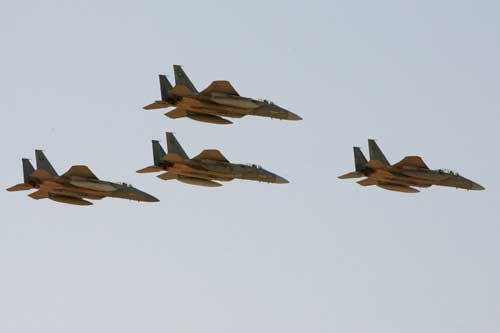Global General
US to ink $60 b Saudi arms sale
(China Daily)
Updated: 2010-10-22 07:44
 |
Large Medium Small |
WASHINGTON - The US State Department announced on Wednesday that the United States plans to sell up to $60 billion of advanced weaponry to Saudi Arabia in one of the largest-ever single US arms sales, a deal intended to counter the rising influence of Iran.
 Saudi Air Force F-15s fly over the Saudi Arabian desert. The US is in the throes of approving a multibillion-dollar sale of fighter jets and military helicopters to Saudi Arabia. [Photo/Agencies] |
The plan allows for the sale of 84 new F-15 fighter jets, upgrades to 70 existing Saudi F-15s, 190 helicopters and a wide array of missiles, bombs and delivery systems, as well as accessories such as night-vision goggles and radar warning systems, Assistant Secretary for political-military affairs Andrew Shapiro said.
The sale, first revealed in September, has been in the works for months and is designed to strengthen the defense forces of Saudi Arabia, a longtime US ally. Though the deal is "not solely about Iran", Shapiro, who announced the deal, admitted it is partly intended to help Saudi Arabia counter the perceived threat from the non-Arab Islamic republic across the Gulf.
Last month, State Department spokesman Philip Crowley said major arms deals to countries like Saudi Arabia and Israel were in the US "national interest" as Washington seeks to keep the region stable and counter potential threats from Iran.
"It will send a strong message to countries in the region that we are committed to support the security of our key partners and allies in the Gulf and broader Middle East," Shapiro said. "And it will enhance Saudi Arabia's ability to deter and defend against threats to its borders and to its oil infrastructure, which is critical to our economic interests."
Congress has 30 days to block the deal, but the officials said they did not expect significant opposition despite concerns by some lawmakers about the impact the sales might have on Israel's security. Shapiro and Alexander Vershbow, the assistant secretary of defense for international security affairs, said the sales would not affect Israel's qualitative military edge in the Middle East and that Israel is not expected to object.
Israeli officials have said previously that they were not pleased with the proposed sales but would not try to prevent them.
Iran is now seen by Israel, the Gulf Arab states and the West as a significant and unpredictable threat that has changed the old calculus of the region's balance of power. The US is realigning its defense policies in the Gulf as Iran improves the range and accuracy of missiles and other weapons that could threaten Israel or US allies in Europe.
Some 77,000 Boeing employees and contractors are to work on the project. In a statement, Boeing said it expect to earn "approximately $24 billion" over the lifetime of the program, with a yearly earning of $4.6 billion.
"We welcome Saudi Arabia's decision to continue to strategically align itself with the United States," Vershbow told reporters. "If approved, this program will be implemented over 15 to 20 years, which means that our defense bond with the Saudis will only continue to grow deeper and stronger."
AFP-AP-Xinhua